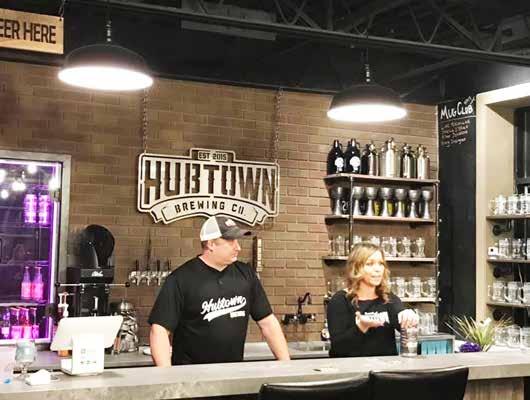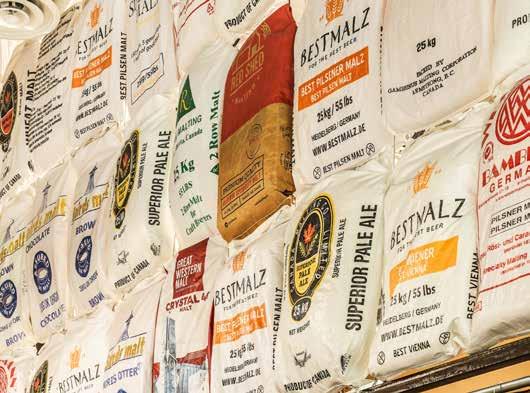
7 minute read
The Greening of Breweries
BY DAVID NUTTALL “Adopt, adapt, improve”
To say the least, 2020 has been a challenging year for all segments of Alberta’s economy. From fluctuating oil prices to a global pandemic, this year has probably forced more companies into survival mode than any previous year in this province’s existence.
Advertisement
When it comes to breweries, adapting is something practically inbred, given the vacillating nature of the industry. The liquor business has always thrived on changing consumer appetites. Not only do product lines
Theoretically Brewing
come and go, but ingredients fluctuate, packaging evolves, and technological requirements constantly need to be addressed. Craft brewing is probably one of the most responsive industries to evolving technologies and consumer demands, given their smaller scale and that much of their product takes only a few weeks to produce. However, they do operate with far less capital than many companies, which requires more creative solutions for any adaptations.
Historically, breweries have tried to maintain as “green” an operation as
possible, mainly because it often helped the bottom line. Any recycling, reusing, and efficiencies that improved brewery operations were practiced, not so much for environmental concerns, but because they usually kept the owners happy. The boom in craft brewing has arrived when it is essential to be environmentally conscious, so best practices are being employed and shared worldwide.
In Alberta, most breweries are brand new, so many have had efficiencies from the start. Still, almost all breweries moved into existing (older) buildings, so energy efficiency is one of the first priorities in the reno. Lighting, heating, electrical, ventilation, insulation, etc. commonly need to be upgraded. Water usage is also a huge concern; some breweries use 10 L of water to produce 1 L of beer. With modern technology, many breweries are down to a 5:1 ratio, and with further improvements can get to a 2:1 ratio. Trapping and reusing clean wastewater also helps keep water usage down, but those improvements cost money and often end up on capital spending lists for the future.
Alberta breweries source as many local
Courtesy Prairie Dog Brewing
ingredients as possible. We have some of the world’s best barley, so buying Alberta malt is easy for most beer styles. Hops are frequently sourced from other locations, but that’s only because there is very little Alberta hop production available. Spent grain (leftovers from the brewing process) or pomace (from cideries) can be recycled in numerous ways. For example, [Theoretically] Brewing Co. of Lethbridge

diverts their organic waste to farmers for animal feed, to community gardens as compost, and to a local bio-gas plant to be converted into methane, which is burned to create electricity. Prairie Dog Brewing of Calgary also uses spent grain as an ingredient in their kitchen.
Packaging is also an important part of the brewing process. Almost all breweries have a growler program which helps keep
Village Craft Winemaker Now is the time to put on your wine FOR CHRISTMAS! So easy - just call in your order 100% Satisfaction Guarantee Bottle your wine in 30 days!



artisan food market


bringing Alberta to your plate

10706 124 st NW, Edmonton | www.meuwlys.com | 587.786.3560
are you in on the secret?
Save money, time and the mess!

403-276-1967 • 358 - 58 Ave S, Unit 105, Calgary, AB Charcuterie, Sausages, & Preserves Monthly Subscription Box secretmeatclub.com
Mark and Lisa Watts, Hubtown Brewing Co.

Courtesy Prairie Dog Brewing

containers recycled. The small brown beer bottle we grew up with is dying before our eyes, being quickly replaced by the 473 mL can. Manufacturing new cans from recycled aluminum takes only about 5% as much energy as creating a new can from bauxite ore and is about three to five times more efficient than bottle manufacturing. Even old de-commissioned kegs can be reused as planters, given or sold to home brewers, or recycled as scrap metal.
For the most part, Alberta craft breweries are aware of their environmental impact and try to upgrade and stay as relevant as fiscally possible. Newer breweries may have the latest advancements that those even a few years old do not have, but there is always a great deal of sharing of best practices within the brewing community that helps further the cause.
In March 2020 however, all systems and plans came to a screeching halt. Restrictions put in place by governments the world over essentially shut down the public’s access to breweries. Since taprooms are the lifeblood of craft breweries, this disconnect from the customer proved to be an unexpected challenge to these businesses. Some breweries sell almost all their beer production from their taproom, “which equated to 99.9% of our gross revenue,” says Hub Town Brewing’s Lisa Watts, especially if they do not bottle or can. Kegs become a non-starter with no open restaurants or bars to sell them to.
Online delivery and pickups have become the saving grace for breweries. Almost no breweries had set up home delivery pre-COVID 19, so this infrastructure had to be assembled quickly, including converting almost all production to bottles and/or cans. This new business model has kept some staff employed and helps offset the loss of taproom sales.
Nonetheless, even as governments give breweries permission to reopen their taprooms, not all are jumping at the opportunity. There are numerous reasons for this, including reduced occupancy, additional sanitation and PPE costs, and the difficulties of maintaining social distancing. Each brewery is different, especially those with kitchens, so the circumstances remain fluid. Expect more changes to come as places begin to open, but there will be some long-term effects felt throughout the industry, including, sadly, some permanent closures.
Thanks to Kelti Baird, [Theoretically] Brewing Co., Lethbridge; Lisa Watts, Hub Town Brewing, Okotoks; Laura and Gerad Coles, Prairie Dog Brewing; Calgary and Dennis Scanland, SunnyCider, for their input.
David has worked in liquor since the late 1980s. He is a freelance writer, beer judge, speaker, and since 2014, has run Brew Ed monthly beer education classes in Calgary. Follow @abfbrewed.
Live Events We’re starting slowly with live events and small groups to ensure your safety and proper social distancing. Please check our website regularly for new evenings and packages!

Vine & Dine Franca’s Italian Specialties Wednesday July 22, Thursday July 30, and Wednesday August 12 Italian is our most often requested cuisine, and we are coming back to Franca’s, one of Calgary’s hidden gems, for three 6-course pairing dinners! $81.75 ++ Vine & Dine Foreign Concept Thursday August 13, Wednesday August 19, and Thursday August 27 It’s our 4th season at Foreign Concept, and almost every evening sells out here, so reserve your places at one of these superb 6-course pairing dinners! $81.75 ++ Paired Dinner Packages Everyone is loving our series of high quality, paired dinner packages for you to enjoy at home, with a video to take you through the dishes and pairings! The hot dishes are ready for you to finish, so they’re as delicious as they would be in the restaurant.
Escoba Bistro Dinner Package Escoba Bistro and Wine Bar is one of our most popular restaurants for public and private evenings ~ and their paired 4-course dinner packages are superb! Fridays Foreign Concept Dinner Package Each Thursday, Chef Duncan Ly is preparing an excellent, paired 4-course dinner of those pan-Asian dishes we love, for us to enjoy at home! Safari Grill Dinner Package Perfect for summer, our 4-course paired dinner package comes ready to eat or you can BBQ the main course at home! Thursdays, Fridays and Sundays Hotel Arts Dinner Package Executive Chef Quinn Staple has put together an outstanding four-course pairing dinner menu, with a main course for you to finish at home. Thursdays
All packages are available in limited quantities for curbside pick up at the restaurant on designated days each week. For full details, check out
culinairemagazine.ca/events
and contact linda@culinairemagazine.ca, 403-870-9802 to reserve your packages, places, or to arrange a private Vine & Dine event.
Alberta’s only province-wide food festival celebrating local food and drink
august 7-16, 2020

supporting alberta’s local restaurants, farms and producers

Lunch & Brunch $15 & $25 | Dinner $25 & $35 | Gourmet Dinner $65 | Kids Menus | Takeaway
PROUDLY SUPPORTED BY
AlbertaONThePlate.com
@ABonthePlate
/AlbertaonthePlate










